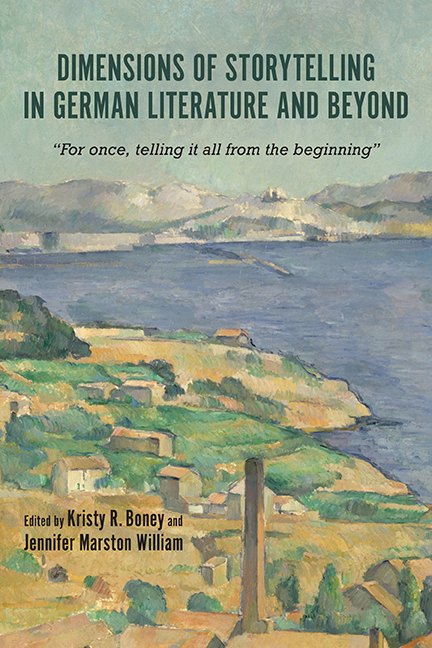 Dimensions of Storytelling in German Literature and Beyond
Dimensions of Storytelling in German Literature and Beyond Book contents
- Frontmatter
- Contents
- Acknowledgments
- Introduction: The Social, Political, and Personal Dimensions of Storytelling
- Part I Anna Seghers: A Missing Piece in the Canon of Modernist Storytellers
- 1 Anna Seghers in Heidelberg: The Formative Years
- 2 Who Is the Narrator? Anna Seghers's “The Excursion of the Dead Girls”: Narrative Mode and Cinematic Depiction
- 3 Anna Seghers's Rubble Literature, 1947–49
- 4 Anna Seghers and the Struggle to Tell Stories about the Nazi Past in the Early German Democratic Republic
- 5 Aufbauzeit or flaue Zeit? Anna Seghers's GDR Novels
- 6 The Time of Decision in Anna Seghers
- 7 Filling the Void with Stories: Anna Seghers's Conceptual Metaphors
- Part II Expressions of Modernity: Using Storytelling Unconventionally
- Part III The Personal Narrative: Storytelling in Acute Historical Moments
- Notes on the Contributors
- Index
1 - Anna Seghers in Heidelberg: The Formative Years
from Part I - Anna Seghers: A Missing Piece in the Canon of Modernist Storytellers
Published online by Cambridge University Press: 12 April 2019
- Frontmatter
- Contents
- Acknowledgments
- Introduction: The Social, Political, and Personal Dimensions of Storytelling
- Part I Anna Seghers: A Missing Piece in the Canon of Modernist Storytellers
- 1 Anna Seghers in Heidelberg: The Formative Years
- 2 Who Is the Narrator? Anna Seghers's “The Excursion of the Dead Girls”: Narrative Mode and Cinematic Depiction
- 3 Anna Seghers's Rubble Literature, 1947–49
- 4 Anna Seghers and the Struggle to Tell Stories about the Nazi Past in the Early German Democratic Republic
- 5 Aufbauzeit or flaue Zeit? Anna Seghers's GDR Novels
- 6 The Time of Decision in Anna Seghers
- 7 Filling the Void with Stories: Anna Seghers's Conceptual Metaphors
- Part II Expressions of Modernity: Using Storytelling Unconventionally
- Part III The Personal Narrative: Storytelling in Acute Historical Moments
- Notes on the Contributors
- Index
Summary
NETTY REILING, as Anna Seghers was called by her maiden name, matriculated at the University of Heidelberg on April 20, 1920. (In this essay I will refer to the student as Netty Reiling, to the writer as Anna Seghers.) She published her first story, which she wrote while still a student, under the name Seghers, and as Anna Seghers she would become one of the most if not the most important German woman writer of the twentieth century. At the time Heidelberg was considered “the secret capital of intellectual Germany.” Among the professoriate many were liberal to left, which was not the norm among German professors either before or after the First World War. They included Max and Alfred Weber, Emil Julius Gumbel, Gustav Radbruch, and Netty Reiling's teachers Emil Lederer, Carl Neumann, Hermann Oncken, and Karl Jaspers. Among the students there were many who later made a name for themselves, veterans of the First World War like Carl Zuckmayer, Carlo Mierendorff, and Leo Löwenthal, and of course younger ones, like Hannah Arendt (she came after Netty Reiling) and Jürgen Kuczynski, as well as émigrés from Eastern Europe, some of whom would become her friends. Many of them, not only Zuckmayer, left vivid descriptions of the intellectual atmosphere in Heidelberg during their time. He is the only one, however, who gave us his well-known recollections of the young, pretty, and somewhat shy Netty Reiling and his speculations about how she chose the pen-name Seghers— from the Dutch painter and Rembrandt contemporary Hercules Segers (or Seghers), who was being rediscovered and interpreted by an instructor and his students in Heidelberg. Other young intellectuals, most notably Georg Lukács and Walter Benjamin, whom Seghers would get to know later on, came to town at different times, one for a few years, the other briefly in search of the all-important Habilitation (the next step after a doctorate and the prerequisite for a university career) and the academic employment it promised. Neither received the chance, Benjamin finding Karl Mannheim already in place. The difficulties of securing an academic or other appropriate position loomed as a dark cloud over the young people and their heady intellectual enterprises, especially over those of Jewish descent, who made up a sizeable contingent.
- Type
- Chapter
- Information
- Dimensions of Storytelling in German Literature and Beyond“For once, telling it all from the beginning”, pp. 13 - 23Publisher: Boydell & BrewerPrint publication year: 2018
